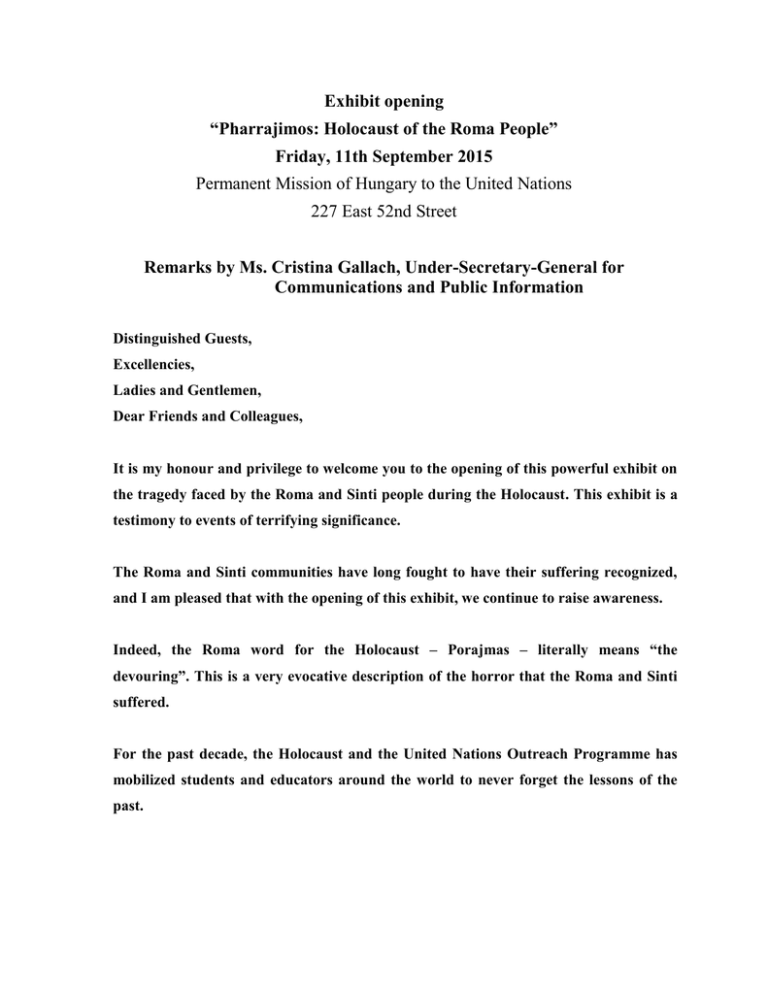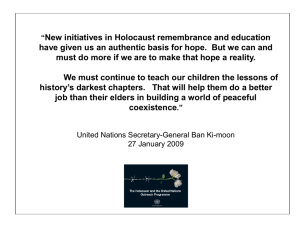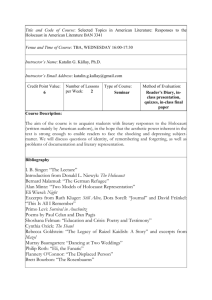Opening remarks Cristina Gallach, Under-Secretary-General for Communications and Public Information
advertisement

Exhibit opening “Pharrajimos: Holocaust of the Roma People” Friday, 11th September 2015 Permanent Mission of Hungary to the United Nations 227 East 52nd Street Remarks by Ms. Cristina Gallach, Under-Secretary-General for Communications and Public Information Distinguished Guests, Excellencies, Ladies and Gentlemen, Dear Friends and Colleagues, It is my honour and privilege to welcome you to the opening of this powerful exhibit on the tragedy faced by the Roma and Sinti people during the Holocaust. This exhibit is a testimony to events of terrifying significance. The Roma and Sinti communities have long fought to have their suffering recognized, and I am pleased that with the opening of this exhibit, we continue to raise awareness. Indeed, the Roma word for the Holocaust – Porajmas – literally means “the devouring”. This is a very evocative description of the horror that the Roma and Sinti suffered. For the past decade, the Holocaust and the United Nations Outreach Programme has mobilized students and educators around the world to never forget the lessons of the past. We are grateful to our many partners – including the Government of Hungary – who have contributed to this work. Last year alone, with the support of our UN Information Centres, Holocaust commemorative activities took place in more than 40 countries. The Programme also has educational materials available on its website on the history of the Roma and Sinti during the Holocaust. The materials include stories on the personal experiences of the Roma and Sinti that we have collected as well as backgrounders. One such story is told in the study guide and DVD titled “Women and the Holocaust: Courage and Compassion”, featuring Julia Lentini. She is a Romani woman whose family was deported from Germany to Auschwitz Birkenau, the German Nazi concentration and extermination camp. Miraculously the family survived. Many more did not. The Programme also publishes a journal of articles written by leading Holocaust and genocide scholars from around the world. We are proud to have included in one of our issues an article by His Excellency László Teleki, Member of Parliament in Hungary, and for mer Secretary for Roma Affairs. He is with us this afternoon. I brought some copies for distribution today. And every January, the United Nations observes a global commemoration of the Holocaust so that the world does not forget one of the darkest chapters in human history. At our next Memorial Ceremony in January 2016, we will be honoured to have the participation of a Sinto survivor, Mr. Zoni Weisz, who will deliver his personal testimony. Mr. Weisz addressed the German Bundestag in 2011, where he gave a moving speech about the suffering endured by his people in the past, and how they once again face discrimination in Europe. Mr. Weisz said, “It is unacceptable that a people that has been discriminated against and oppressed for centuries is today, in the 21st Century, still shut out and robbed of any honest chance of a better future.” The Secretary-General of the United Nations, Mr. Ban Ki-moon has spoken forcefully against this discrimination, and against the discrimination faced by minorities. Violence and bias towards minorities, according to the Secretary-General are “stark reminders of the distance still to travel in upholding human rights, preventing genocide and defending our common humanity.” The Secretary-General has been clear: “We must redouble our efforts to eradicate the deep roots of hatred and intolerance. People everywhere must unite to stop the cycles of discord and build a world of inclusion and mutual respect.” Indeed, as we mark the 70th Anniversary of the UN, let us commit anew to protecting the vulnerable, promoting fundamental human rights, and upholding the freedom, dignity and worth of every person. The exhibit that we are opening this afternoon is a remarkable and moving demonstration of these values. Our thoughts go to the victims, survivors, and relatives who lost their loved ones. We pay our deepest respects to them all. Thank you.


